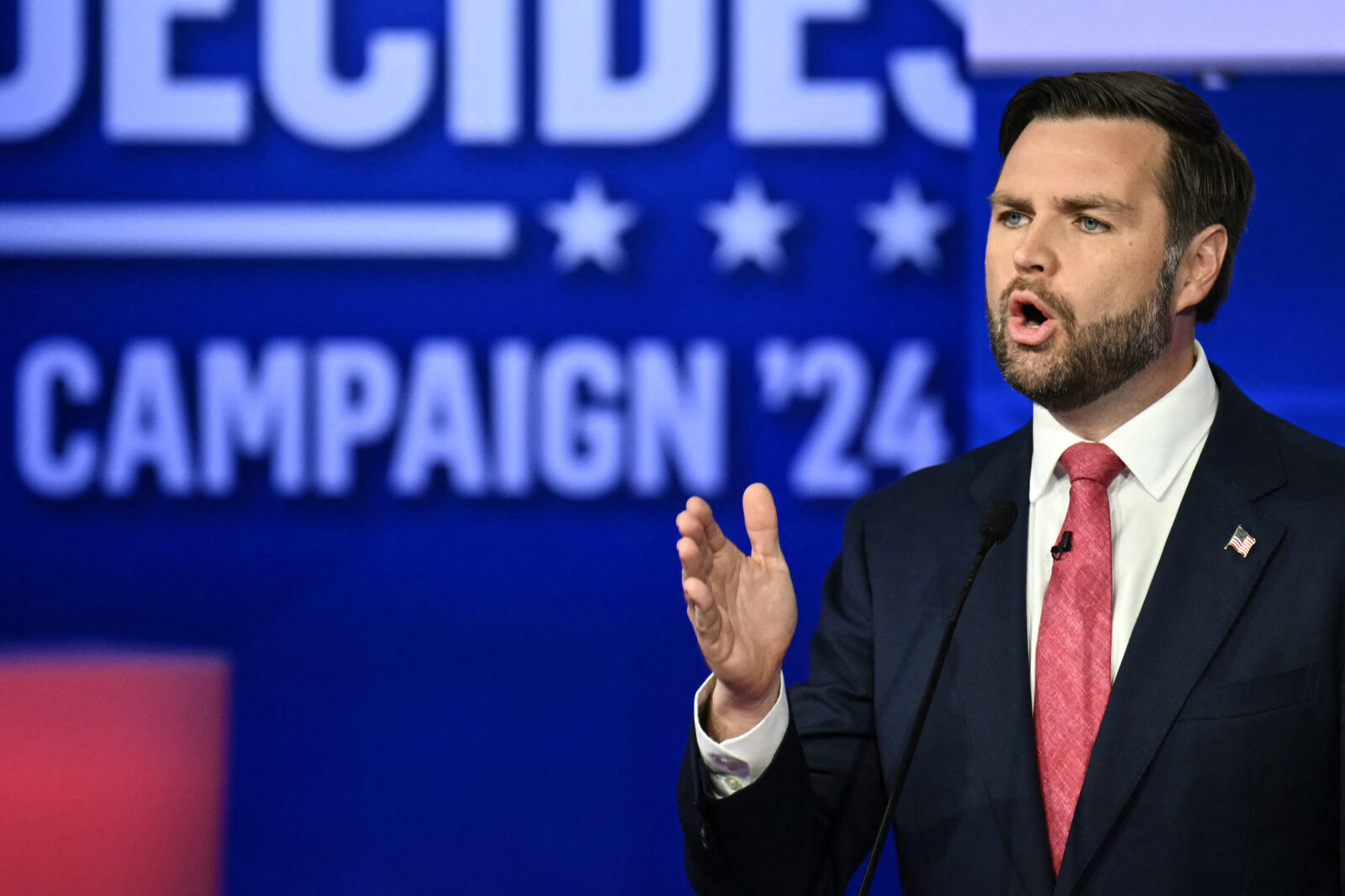Waltz debate performance shows Shapiro could’ve been better Harris VP pick
 Minnesota Governor and Democratic vice presidential candidate Tim Walz speaks during the Vice Presidential debate with US Senator and Republican vice presidential candidate J.D. Vance, hosted by CBS News at the CBS Broadcast Center in New York City on October 1, 2024. (AFP Photo)
Minnesota Governor and Democratic vice presidential candidate Tim Walz speaks during the Vice Presidential debate with US Senator and Republican vice presidential candidate J.D. Vance, hosted by CBS News at the CBS Broadcast Center in New York City on October 1, 2024. (AFP Photo)
The vice-presidential debate between Minnesota Governor Tim Walz and Ohio Senator JD Vance was highly anticipated, but it left Kamala Harris’s campaign in an uncertain position. Walz, chosen as Harris’s running mate to balance her perceived weaknesses and appeal to Midwestern voters, did not have the kind of debate performance that inspires confidence.
Waltz’s halting, sometimes nervous responses during key moments gave the impression of a candidate struggling to meet the high expectations of a national stage. This has left many political observers wondering whether another rising Democratic star, such as Pennsylvania Governor Josh Shapiro, might have been a more strategic and dynamic choice for Harris’s ticket.
While Walz’s debate performance wasn’t a complete disaster, especially compared to Biden’s debate performance, it came short of Harris’s domination in the first and only presidential debate between her and Trump.
Walz’s debate performance was marred by several awkward moments that stood in stark contrast to his opponent, Senator JD Vance, who came across as polished, confident, and in control of the narrative.
Vance’s commanding presence
Vance, known for his strong media presence and affiliation with the Trump wing of the Republican Party, delivered a performance that was calculated to energize the GOP base.

He smoothly navigated topics such as inflation, border security, and U.S.-China relations, echoing the party’s hardline stances, while also peppering in criticisms of Harris’s administration in ways that felt sharp and effective.
In contrast, Walz seemed to struggle to gain his footing, especially in the debate’s opening moments. His attempts to tackle foreign policy, especially the fraught situation between Israel and Iran, felt underprepared. His discussion of the Middle East lacked the depth and nuance that voters might expect from a vice-presidential candidate.
Additionally, Walz stumbled badly when he referenced being present during the 1989 Tiananmen Square protests, a claim that was quickly fact-checked and proven misleading. While he did eventually correct himself, the damage was done, as it fed into a narrative of a candidate who lacks precision and gravitas.
Perhaps the most glaring misstep of Walz’s night came when he tried to frame himself as the moderate voice that could win over swing voters in key battleground states. However, his policy positions, including his defense of the Inflation Reduction Act and his focus on climate change, felt overly technical and devoid of the passion that might sway undecided voters.
In stark contrast, Vance delivered crisp, memorable soundbites that will likely resonate with the GOP base and beyond. He skillfully tied Harris’s administration to inflation woes, government overreach, and a failure to secure the southern border—all issues that strike a nerve with American voters.
One of the key moments that could have bolstered Walz’s performance was his confrontation with Vance over the 2020 election and Donald Trump’s refusal to concede. Here, Walz did manage to regain some composure, forcefully challenging Vance on his continued support for Trump and the GOP’s role in undermining democracy. However, while the confrontation may have played well with Harris’s base, it lacked the kind of decisive punch needed to dominate the debate. This allowed Vance to pivot back to economic issues, further undermining Walz’s ability to make a lasting impact.
Shapiro’s strengths could’ve played better for the Democratic ticket
Given Walz’s uneven performance, many Democrats are now questioning whether he was the right choice for Harris’s running mate in the first place. His aw-shucks demeanor, while endearing to voters in Minnesota, does not necessarily translate well to a national audience.
More importantly, it lacks the kind of sharpness and charisma needed to go head-to-head with the likes of Vance and the broader Trump-aligned GOP. This has led to increasing speculation that someone like Pennsylvania Governor Josh Shapiro could have been a far better fit for the role.
Shapiro, who has gained national attention for his handling of the I-95 collapse and his proactive governance in Pennsylvania, possesses the kind of gravitas and media savvy that would likely have played better on a debate stage. His background as a tough-on-crime prosecutor and his ability to navigate difficult political waters with a blend of pragmatism and bold leadership have earned him a reputation as a rising star within the Democratic Party.
Many political analysts have noted that Shapiro’s more polished approach and broader national appeal might have made him a stronger contender, particularly in swing states like Pennsylvania, Michigan, and Wisconsin, where every vote will count in the upcoming election.
Shapiro’s ability to connect with working-class voters, a demographic that Walz has struggled to win over, could have given Harris a significant advantage in key battlegrounds. His debate style is known to be sharp, concise, and empathetic—qualities that would have made him a formidable opponent for Vance.
Furthermore, Shapiro’s track record of handling crises and pushing forward progressive policies with a pragmatic approach would have been a strong complement to Harris’s experience on the national stage. His presence on the ticket could have mitigated concerns about Harris’s own popularity and provided a fresh, dynamic voice to energize the Democratic base.
In contrast, Walz’s performance has left the Harris campaign vulnerable to criticism. It has reinforced the perception that the ticket lacks the dynamism needed to inspire confidence among swing voters and independent voters, who may be leaning toward Trump or sitting out the election altogether.
While Walz does bring some regional appeal, his debate performance suggests that he may not be ready for the scrutiny and pressure that comes with being a heartbeat away from the presidency. His tendency to waffle on key issues, paired with his uneven delivery, does little to allay concerns about his ability to step into the role of vice president.
Implications for the Harris campaign
This VP debate could have been an opportunity for the Harris-Walz ticket to shift the momentum in their favor, especially as they face a tight race against Trump and Vance. Instead, Walz’s tepid showing may give the GOP the critical edge they need to sway undecided voters.
It also raises legitimate questions about the Harris campaign’s strategic decision-making. Had they chosen Shapiro, or someone with a similarly commanding presence, the debate outcome—and perhaps the election—might look very different today.
As the election enters its final weeks, Harris and Walz will need to work hard to regain control of the narrative and assure voters that they are the right team to lead the country forward. However, the doubts raised by Walz’s debate performance won’t be easy to shake, and they may haunt the campaign as they fight to close the gap in key battleground states. For now, the VP debate has cast a shadow of uncertainty over a race that remains too close to call.



